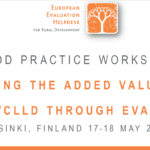ELARD organised this conference from 30.11 to 3.12.2021 in Halmstad (Sweden) to celebrate 30 years of LEADER and also to look forward: “We will take a look on successful LEADER-implementation during 30 years, but also investigate how we can work for local democracy and participatory approaches all over rural Europe in order to build a […]
Highlights from the LEADER/CLLD 2019 Conference
ELARD and the Portuguese LEADER network Minha Terra have organised the last gathering under the Portuguese Presidency of Maria João Botelho in the beautiful town of Amarante in Northern Portugal, hosted by the LAG Dolmen. The workshop on 25.11.2020 served as an exchange platform to discuss the state of play in the member countries and […]
The LEADER Approach and Social Innovation in Rural Areas – a Liaison?
R. Lukesch, H. Gassler, B. Ecker, L. Fidlschuster, M. Fischer, S. Mair, S. Philipp, N. Said[1] Abstract –The research project SILEA aimed at exploring the significance, extent and possible effects of Social Innovation in the framework of the LEADER Measure of the Austrian Rural Development Program 2014-20. The study leaned onto a complex mix of […]
4th European Rural Parliament – Let Europe´s rural voice be heard
The 4th European Rural Parliament took place in the rural, green north of Spain, in the coastal village of Candás (Asturias) from 6th to 9th November 2019. Alistair Adam Hernández participated and his report is presented below. I attended the ERP as LDnet representative and was kindly invited to join the German delegation. The choice […]
The agripolitan city, the cosmopolitan village
“La ciudad agropolitana. La aldea cosmopolita” (The agripolitan city, the cosmopolitan village) is a new book by Jaime Izquierdo Vallina who has written extensively on urban-rural issues, nature conservation, and new perspectives for approaching rural areas. In his prologue to the book, Yves Champetier has highlighted that over the years, Jaime Izquierdo Vallina has deepened […]
CAP Strategic Plans: Where is LEADER?
We are moving towards the adoption of the provisions regarding LEADER in the 2021-2027 period, but it is still difficult to place LEADER in the new architecture of CAP. The proposals of the European Commission regarding Community-led Local Development (CLLD) and LEADER were published in May/June 2018. The legislative process is in progress and a […]
A powerful contribution on the future of local development in the EU
A major contribution by Yves Champetier has been published by AEIDL entitled Europe: a major player in the development of territories. In this Yves offers a personal account and an overview of the progress that has been made over the last 40 years and the challenges facing us today. In his article he concludes: A […]
LEADER in the witness box: Hearing in the European Parliament
On 22 November 2018, the AGRI Committee, together with the CONT (Budgetary Control) Committee of the European Parliament held a Public Hearing on LEADER experiences – lessons learned and effectiveness of EU funds for rural development. The aim was to evaluate how the LEADER programme had worked over the past, what its added value was […]
CLLD/Leader: Past, present and future
In this wide-ranging paper Robert Lukesch goes back to the precursors of Leader and looks at each stage of its evolution, highlighting the complex principles behind this approach (“more than the seven features and usual clichés”) and discussing success factors. He takes us to the current CLLD/Leader period and looks at what lies ahead. He […]
CLLD post-2020: Main proposals and changes
The proposals of the European Commission regarding Community-led Local Development (CLLD) and Leader were published before the Summer. In the following note Urszula Budzich-Tabor distils the main proposals and offers a comparison with the 2014-2020 period. However, not everything is 100% settled and, as Jean-Pierre Vercruysse has commented, there are some proposals in the draft […]
Preserving the specific features of CLLD post-2020
In May 2018, the European Commission published its proposals for CLLD/LEADER in the post-2020 period. The overall impression is that these proposals, broadly speaking, amount to a continuation of the approach and rules applying to CLLD/LEADER in the current, 2014-2020 period. But as already noted by Robert Lukesch in his ‘LEADER RELOADED‘ paper, there will […]
Showing the added value of LEADER/CLLD through evaluation
This good practice workshop is organised by the European Evaluation Helpdesk for Rural Development in collaboration with the Finnish National Rural Network and the Ministry of Agriculture and Forestry. It will take place on 17-18 May 2018 in Helsinki, Finland. This workshop aims to: contribute to shaping a common understanding of the addedvalue of LEADER/CLLD […]










